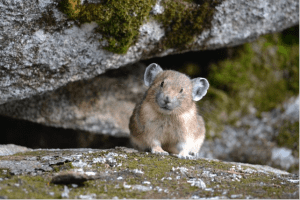 A research project funded by Seattle City Light is working to answer the question: “How is climate change affecting high elevation mammal populations such as pika?”
A research project funded by Seattle City Light is working to answer the question: “How is climate change affecting high elevation mammal populations such as pika?”
Seattle City Light’s Wildlife Research Grants Program began in 1995 as one of the requirements of the federal license to operate the Skagit River Hydroelectric Project. The main goal of the program is to “facilitate the development of improved methods for the understanding, management and protection of wildlife resources in the North Cascades ecosystem, with an emphasis on the Skagit River Watershed.”
Each year, the program funds a number of qualified projects selected through a competitive application process. Priority is given to projects that address topics of interest to the agencies in the Skagit River Hydroelectric Project Area, the Skagit River Watershed and the North Cascades/ Western Okanagan ecoregions.
One ongoing project in the North Cascades National Park Complex is studying the American pika (Ochotona princeps). The project is addressing the research question: “How is climate change affecting high elevation mammal populations such as pika?”
The American pika is a very outgoing herbivore that is a tiny relative of rabbits and hares. These critters can be found at high altitudes in North American mountain ranges. In order to test the effect climate has on these mammals, this research project will be retrieving DNA samples through hair snares. Samples will be taken at multiple different location sites at multiple levels of elevation.
This research project is still underway and is expected to be completed within the next year. Check out the University of British Columbia researchers’ Pika blog at http://www.science-live.org/pikas/follow/.
